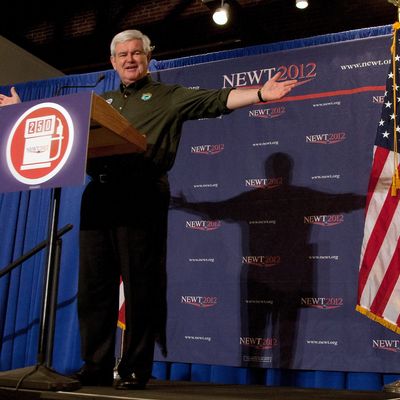
Running for president was a catastrophic error for Newt Gingrich, a man prone to catastrophic errors. He dynamited his reputation, blew a hole in his net worth, and sabotaged his future earnings ability by giving his opponents an incentive to expose his influence-peddling business for what it was. And yet Gingrich’s seminal achievement remains fully intact. He redefined the Republican Party as an ideologically disciplined, parliamentary-style party. And, in particular, he made it a party of anti-tax fundamentalism.
When Republicans invoke opposition to taxes as their central tenet, they usually invoke Ronald Reagan. It was Reagan who introduced large peacetime, debt-financed tax cuts and inaugurated the era of mass deficits. But Reagan, having leapt wholesale into this new territory at the outset of his presidency, spent the rest of it crawling back. Reagan passed a huge tax cut in 1981, but the enormous deficits, and the ability of rich people to escape taxation, haunted his advisors. Reagan signed on to a series of tax hikes in subsequent years, and supported a tax reform that ended the capital gains loophole. He remained rhetorically opposed to taxes, but in practice Reagan had only evolved a bit from the fiscal traditions of previous balanced-budget Republicans.
George H.W. Bush, Reagan’s vice-president, followed in Reagan’s footsteps. He ran for president vowing to oppose any tax hikes, but when it came time to bargain, he accepted them in the same way that Reagan did. Bush’s 1990 budget deal, mixing spending cuts, slightly higher taxes, and new budget rules to stop deficit-financed entitlements or tax cuts, helped produce a decade of reduced spending and deficits.
But the lasting legacy of the deal was a rebellion that Gingrich led against it. Denouncing the bargain as a sellout, Gingrich rallied Republicans in the House to oppose it wholesale. Conservative organs like the Wall Street Journal editorial page and National Review denounced the deal (“the fiscal equivalent of Yalta,” referring to the post-war bargain Western leaders struck with Stalin) and spent years building up ideological antibodies to ensure that such a sellout never occurred again. It was Gingrich who made “no new taxes” not just a slogan but a governing (or anti-governing) philosophy.
Gingrich’s vision has utterly prevailed within his party. Since 1990, zero Republicans in the House or Senate have accepted a tax hike. John Boehner clearly wanted to strike a deal last summer that would produce higher revenue, but the Republican caucus made clear it would renounce any such agreement, however favorable the terms may be.
Gingrich was a true pioneer in his recognition that the social norms that governed the behavior of the parties in Washington were an anachronism. The best way for the minority party to regain power, he understood, was a slash-and-burn campaign to discredit the majority. But the methods Gingrich pioneered were harnessed to an ideology, and that ideology retains just as strong a hold over its party today as it did when Gingrich rose to power two decades ago.






























